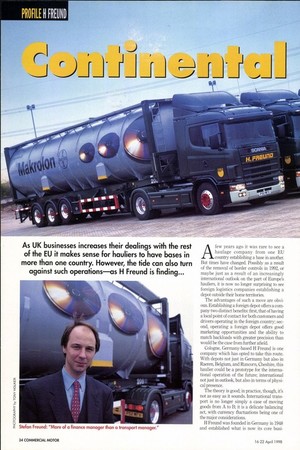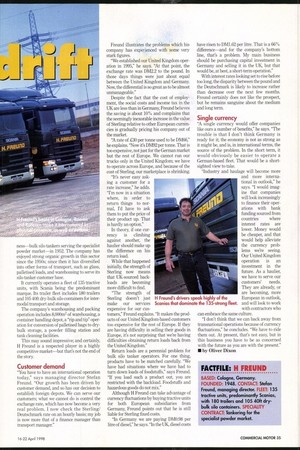I _ As UK businesses increases their dealings with the
Page 36

Page 37

If you've noticed an error in this article please click here to report it so we can fix it.
rest of the EU it makes sense for hauliers to have bases in more than one country. However, the tide can also turn against such operations—as H Freund is finding... Afew years ago it was rare to see a haulage company from one EU country establishing a base in another. But times have changed. Possibly as a result of the removal of border controls in 1992, or maybe just as a result of an increasingly international outlook on the part of Europe's hauliers, it is now no longer surprising to see foreign logistics companies establishing a depot outside their home territories.
The advantages of such a move are obvious. Establishing a foreign depot offers a company two distinct benefits: first, that of having a local point of contact for both customers and drivers operating in the foreign country; second, operating a foreign depot offers good marketing opportunities and the ability to match backloads with greater precision than would be the case from further afield.
Cologne, Germany-based H Freund is one company which has opted to take this route. With depots not just in Germany but also in Raeren, Belgium, and Runcorn, Cheshire, this haulier could be a prototype for the international operation of the future; international not just in outlook, but also in terms of physical presence.
The theory is good; in practice, though, it's not as easy as it sounds. International transport is no longer simply a case of moving goods from A to B; it is a delicate balancing act, with currency fluctuations being one of the major considerations.
H Freund was founded in Germany in 1948 and established what is now its core busi ness—bulk silo tankers serving the specialist powder market—in 1952. The company has enjoyed strong organic growth in this sector since the 1950s; since then it has diversified into other forms of transport, such as glass, palletised loads, and warehousing to serve its silo tanker customer base.
It currently operates a fleet of 135 tractive units, with Scania being the predominant marque. Its trailer fleet includes 180 trailers and 105 40ft dry-bulk silo containers for intermodal transport and storage.
The company's warehousing and packing operation includes 8,000m2 of warehousing, a container handling depot, a "rip and tip" operation for conversion of palletised bags to drybulk storage, a powder filling station and tank cleaning facilities.
This may sound impressive; and certainly, H Freund is a respected player in a highly competitive market—but that's not the end of the story Customer demand "You have to have an international operation today," says managing director Stefan Freund. "Our growth has been driven by customer demand, and so has our decision to establish foreign depots. We can serve our customers; what we cannot do is control the exchange rate, which has now become a very real problem. I now check the Sterling/ Deutschmark rate on an hourly basis; my job is now more that of a finance manager than transport manager." Freund illustrates the problems which his company has experienced with some very stark figures.
"We established our United Kingdom operation in 1995," he says. "At that point, the exchange rate was DM2.2 to the pound. In those days things were just about equal between the United Kingdom and Germany. Now, the differential is so great as to be almost unmanageable."
Despite the fact that the cost of employment, the social costs and income tax in the UK are less than in Germany, Freund believes the saving is about 10% and complains that the seemingly inexorable increase in the value of Sterling relative to other European currencies is gradually pricing his company out of the market.
"A rate of £30 per tonne used to be DM66," he explains. "Now it's DM92 per tonne. That is too expensive, not just for the German market but the rest of Europe. We cannot run our trucks only in the United Kingdom; we have to operate across Europe, and because of the cost of Sterling, our marketplace is shrinking.
"It's never easy asking a customer for a rate increase," he adds. "I'm now in a situation where, in order to return things to normal, I'd have to ask them to put the price of their product up. That is hardly an option."
In theory if one currency is climbing against another, the haulier should make up the difference on his return load.
While that happened initially, the strength of Sterling now means that UK-sourced backloads are becoming more difficult to find.
"The strength of Sterling doesn't just make our services expensive for our customers," Freund explains. "It makes the products of our United Kingdom-based customers too expensive for the rest of Europe. If they are having difficulty in selling their goods in Europe, it's not surprising that we're having difficulties obtaining return loads back from the United Kingdom."
Return loads are a perennial problem for bulk silo tanker operators. For one thing, products have to be matched carefully. "We have had situations where we have had to turn down loads of foodstuffs," says Freund. "If you load such a product out, you are restricted with the backload. Foodstuffs and hazardous goods do not mix."
Although H Freund can take advantage of currency fluctuations by buying tractive units for both European subsidiaries from Germany, Freund points out that he is still liable for Sterling fixed costs.
"In Germany we are paying DM0.98 per litre of diesel," he says. "In the UK, diesel costs have risen to DM1.62 per litre. That is a 66% difference—and for the company's bottom line, that's a problem. My main business should be purchasing capital investment in Germany and selling it in the UK, but that would be, at best, a short-term operation."
With interest rates looking set to rise before too long, the disparity between the pound and the Deutschmark is likely to increase rather than decrease over the next few months. Freund certainly does not like the prospect, but he remains sanguine about the medium and long term.
Single currency "A single currency would offer companies like ours a number of benefits," he says. "The trouble is that I don't think Germany is ready for it; the economy is not as strong as it might be, and is, in international terms, the source of the problem. In the short term, it would obviously be easier to operate a German-based fleet. That would be a shortsighted view to take.
"I don't think that we can back away from transnational operations because of currency fluctuations," he concludes. "We have to ride them out. At present, that's not easy, but in this business you have to be as concerned with the future as you are with the present."
• by Oliver Dixon FACTFILE: N FREUND BASED: Cologne, Germany. FOUNDED: 1948. CONTACT Stefan Freund, managing director. 135 tractive units, predominantly Scanias, with 180 trailers and 105 40ft drybulk silo containers. SPECIALITY CONTRACT: Tankering for the specialist powder market.




































































































